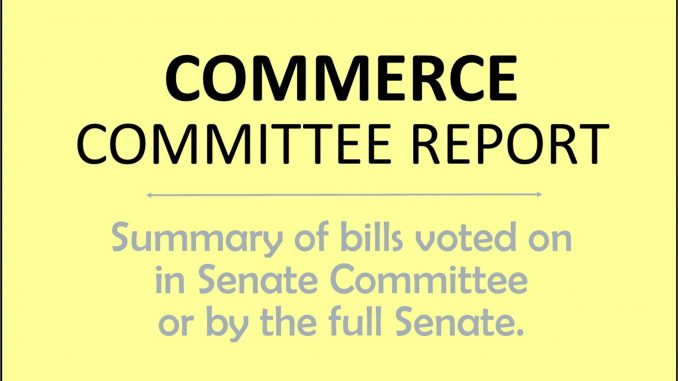
SF 401 – Public utility right-of-way fee
SF 402 – Credit Union Division ‘good faith’ requirement
SF 403 – Credit Union Superintendent subpoena power
SSB 1161 – Insurance assignment of rights to contractors
COMMITTEE ACTION:
SF 401 – Public utility right-of-way fee
SF 401 (SSB 1152) relates to certain fees imposed on public utilities for the use of public rights-of-way [Ch. 480A]. Currently, local governments may impose fees on public utilities for operating facilities in public rights-of-way. A local government may only impose a fee for management costs that are caused by the utility’s activity in the right-of-way, and cannot require in-kind services in lieu of a fee. The bill modifies the definition of “management costs” and requires that such costs must be direct and fully documented. It specifies that a local government may only recover a permit fee for management costs attributable to the utility’s requested use of an available public right-of-way, instead of management costs caused by the utility’s activity in the right-of-way. It provides that Code section 480A.3, relating to permissible fees imposed on public utilities, not prohibit voluntary agreements between a public utility and local government to share services to reduce costs and preserve public rights-of-way for future public safety purposes, and allows in-kind services in lieu of a fee for such voluntary agreements. A companion bill in the House, HF 537 by Commerce, was referred to Ways & Means.
[2/26: short form (No: Bisignano, Bolkcom, Petersen, Quirmbach; Absent: Feenstra)]
SF 402 – Credit Union Division ‘good faith’ requirement
SF 402 (SSB 1176) is a proposal by the Credit Union Division to add a new section to Code Ch. 533 – Credit Unions. It stipulates that any information, record, application or document provided to the division must be provided in good faith. A director, officer, agent or employee of a state credit union, a credit union service organization, or any other person must not intentionally publish, report, submit or file any information, record, application or document that is false or misleading by statement or omission. Any such information provided in the absence of good faith or in violation of the bill may be subject to revocation of prior approval or denial. A companion bill HF 358 is on House calendar.
[2/26: short form (Feenstra absent)]
SF 403 – Credit Union Superintendent subpoena power
SF 403 (SSB 1175) is a recommendation by the Credit Union Division of the Department of Commerce. Currently, the superintendent of credit unions can subpoena witnesses and compel the production of any relevant record only during the period of an examination of a state credit union. This bill expands the timeframe to include the examination period and time related to any report or filing made by or provided to the division. If a person subpoenaed by the superintendent fails to produce a record as required by the terms of the subpoena, the superintendent may apply to Polk County district court to issue an order compelling compliance. The refusal of any person to obey such an order without reasonable cause constitutes contempt of court. A companion bill HF 357 is on the House calendar.
[2/26: short form (Absent: Feenstra)]
SSB 1161 – Insurance assignment of rights to contractors
SSB 1161 relates to post-loss assignment of rights to residential contractors for repair or services performed on residential real estate covered by property and casualty insurance. The Attorney General strongly opposed the original proposals (SSB 1161 and HSB 33), but worked with legislators and stakeholders to craft legislation that included the recommended consumer protections (HF 417). The Committee approved an amendment to conform SSB 1161 to HF 417. As amended, the legislation allows the insured to cancel the contact at the later date of either the execution date or the date in which the insured receives the assignment; adds one additional notice provision that must be included in the contract/assignment (notice of the right to cancel and the process to do so); and makes a violation an unlawful practice under 714.16 – Consumer Frauds. The contract between the insured and the contractors is void if a contractor violates any requirement related to the post-loss assignment of rights or benefits by the insured to the contractor.
The post-loss assignment must include an itemized description of, and the materials, labor and fees for, the work to be performed, including a total itemized amount. It also requires that the post-loss assignment include a statement and a notice, in 14-point type, that the contractor has not represented that the claimed loss will be fully covered by insurance. After the post-loss assignment is executed, a copy must be provided to the insurer of the real estate within five business days. The insured has the right to cancel the assignment for any reason within those five business days. If the insured cancels, the contractor must return any payments made by the insured, the landowner or the possessor of the real estate.
Any written contract, estimate or work order prepared by the contractor must include a notice advising the insured that the insured is responsible for payment to the contractor for any goods or services provided by the contractor, even if the insured does not receive payment from the insurance policy. The notice also advises the insured that if the contractor advertises or promises to rebate the insured’s deductible, or represents or negotiates, or offers to represent or negotiate with the insured’s property and casualty insurer on behalf of the insured, the insured is not responsible for payment to the contractor under the contract, estimate or work order. A copy of the document, signed by the insured, must be sent to the insured’s insurance company prior to the contractor being paid from the proceeds of the insurance.
[2/26: short form (Absent: Feenstra)]
